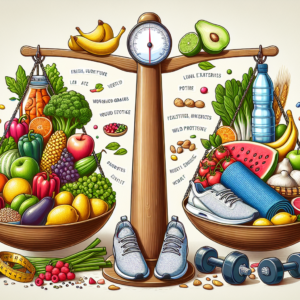Are you feeling frustrated and questioning why it’s taking you so long to shed those stubborn 10 pounds? Well, you’re not alone! Many people have found themselves in a similar situation, wrestling with the same question. In this article, we’ll explore some common reasons that may be causing this delay in your weight loss journey and provide you with helpful insights on how to overcome them. So, if you’re eager to discover why the scale seems stuck, keep reading!
Possible Reasons for Slow Weight Loss

Unrealistic Expectations
One possible reason for slow weight loss could be unrealistic expectations. Often, people set lofty goals for themselves, expecting quick and dramatic results. However, it’s essential to remember that healthy weight loss is a gradual process. Setting realistic goals allows you to make sustainable changes and focus on long-term success. Comparing yourself to others can also contribute to unrealistic expectations, as everyone’s weight loss journey is unique. Instead, focus on your own progress and celebrate each milestone along the way.
Slow Metabolism
Another reason for slow weight loss could be a slow metabolism. Your metabolism is responsible for converting food into energy and burning calories. Various factors can influence metabolism, such as age, genetics, and body composition. While you cannot control your genetics, there are ways to boost your metabolism naturally. Regular exercise, particularly strength training, can increase muscle mass and raise your resting metabolic rate. Eating enough protein, staying hydrated, and ensuring adequate sleep can also support a healthy metabolism.
Lack of Regular Exercise
A sedentary lifestyle can hinder weight loss progress. Regular exercise not only burns calories but also helps increase metabolism and build lean muscle mass. Engaging in physical activity for at least 150 minutes per week, as recommended by experts, can contribute to weight loss. Incorporate a combination of cardiovascular exercises, like brisk walking or cycling, and strength training exercises, such as weightlifting or bodyweight exercises, in your routine. Finding enjoyable activities and varying your workouts can help you stay motivated and make exercise a habit.
Inadequate Caloric Deficit
Weight loss occurs when you create a caloric deficit, meaning that you consume fewer calories than you burn. If your weight loss progress is slow, it’s possible that your caloric deficit is not sufficient. While it’s important to create a significant deficit, it’s equally crucial to strike a balance and avoid extreme restriction. Consuming too few calories can slow down your metabolism and lead to muscle loss. To determine the right caloric deficit for you, consult with a healthcare professional or a registered dietitian who can provide personalized guidance.

Overeating on Non-Diet Days
Many people follow a structured diet plan but struggle with overeating on non-diet days or during social events. It’s important to find a balance between being disciplined and enjoying occasional indulgences. Restricting yourself too much can lead to feelings of deprivation, which may ultimately result in overeating. Practice mindful eating by paying attention to your body’s hunger and fullness cues. Additionally, plan for social events and find strategies to navigate them successfully, such as choosing healthy options or practicing portion control.
Water Retention
Water retention, also known as edema, can cause temporary weight fluctuations. Factors such as high sodium intake, hormonal changes, certain medications, and underlying health conditions can contribute to water retention. While it doesn’t directly affect fat loss, it can make you feel bloated and discourage you from stepping on the scale. To reduce water retention, try decreasing your sodium intake, drinking plenty of water, and incorporating natural diuretics like cucumber and lemon into your diet. Additionally, regular exercise and elevating your legs can help alleviate fluid retention.
Lack of Consistency
Consistency is key when it comes to weight loss. Following a healthy eating plan and exercise routine consistently over time yields better results than sporadic efforts. Establishing a routine that suits your schedule and lifestyle can help you stay on track. Planning and preparing meals in advance, scheduling regular workout sessions, and tracking your progress can enhance consistency. Remember that small setbacks are normal, and it’s important to bounce back and continue working towards your goals.
Inefficient Workout Routine
An inefficient workout routine may also contribute to slow weight loss. It’s essential to choose exercises that target different muscle groups and maximize calorie burn. Incorporating resistance training into your routine can increase muscle mass, boost metabolism, and enhance overall fat loss. Ensure that you perform exercises with correct form and intensity to engage the appropriate muscles effectively. Working with a certified personal trainer or following workout programs designed by professionals can help you optimize your routine.
Lack of Sleep
Sleep plays a crucial role in weight management. Inadequate sleep can disrupt hormonal balance, increase hunger hormones, and decrease satiety hormones, leading to overeating and weight gain. Aim for seven to nine hours of quality sleep each night to support your weight loss efforts. Establishing a regular sleep schedule, creating a relaxing bedtime routine, and optimizing your sleep environment can contribute to better sleep quality and quantity.
Medical Conditions
Certain medical conditions may contribute to slow weight loss or difficulty in losing weight. Conditions such as hypothyroidism, polycystic ovary syndrome (PCOS), and insulin resistance can affect metabolism and make it harder to shed pounds. If you have been consistently following a healthy lifestyle and experiencing difficulties in losing weight, it may be beneficial to consult with a healthcare professional. They can help identify any underlying health issues and provide appropriate guidance and treatment options.
By exploring these possible reasons for slow weight loss and implementing strategies to address them, you can enhance your weight loss journey and improve your chances of reaching your goals. Remember to approach weight loss with patience, consistency, and a focus on overall well-being rather than solely on the number on the scale. With time and effort, you can achieve sustainable and lasting weight loss results.



